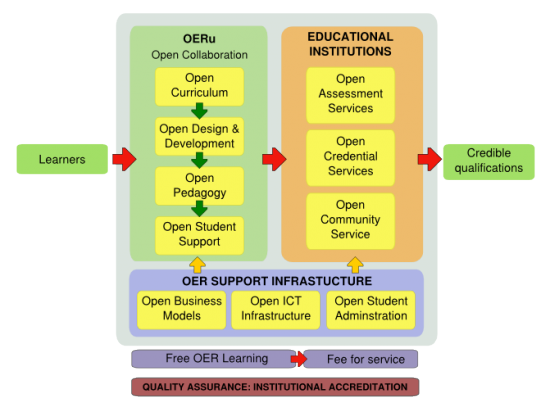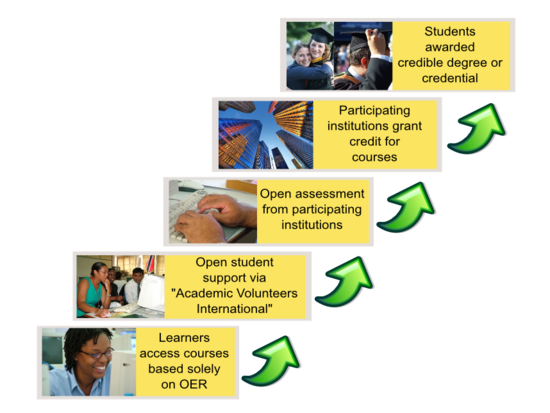http://wikieducator.org/OER_for_Assessment_and_Credit_for_Students/Virtual_participation
This SCoPE seminar has been planned to stimulate discussion in advance of todays meeting and to provide a forum for follow-on discussion after today's meeting. I promised Wayne I'd provide a short summary of our discussions and drop-in think tank web conference as an input into today's face to face meeting.
Here's what I submitted:
OER University - A Summary of SCoPE Seminar Inputs
The following notes are summarized from SCoPE OERu online discussions and an OERu drop-in think tank web conference session held over the period 4-21-Feb-2011. The summary has been distilled from contributions made by participants from Israel, United States, New Zealand, India, Canada, Netherlands, Australia, United Kingdom, Pakistan, Portugal, and Brazil.
OER University Model and Ideas
The OERu:
- is a a consortium of partner universities - a university of universities. Participating colleges/universities are given an OERu logo to post on their web-sites designating them as participants.
- un-bundles the package of services traditional universities provide: recommending (and selling) learning materials, forming learning groups, arranging learning experiences, supplying teachers, certifying
- provides a search service for OER materials and maintains a repository of credit based OER approved by the consortium
- brings together currently separate OER initiatives to generate collaboration between them for development and assemblage of OER into mutually credentialed outcomes.
- creates a framework within which existing OER can be assembled and new OER development positioned.
- establishes a world OER credit bank and trans-national qualifications framework. Institutions developing OER can register their OER with the credit bank specifying what credit they are willing to accord those who successfully complete the learning outcomes associated with it. OERu assembles or creates the transfer/articulation aspects of assembling OER into a credential. Each OERu university partner can link existing OER courses of other partner universities to its OER degree programmes
- facilitates creation of an OER learning path, learning plan, and/or PLAR documentation template for students ideally through consultation with advisor or mentor
- helps learners systematically pursue learning plan and create a portfolio that can be assessed
- provides student support resources to help students navigate their learning paths and compile portfolios. Partners with institutions who provide options for student support possibly on a fee for service basis. A 24x7 call center for assisting students.
- creates a social learning context for OER reinserting or applying pedagogy to OER. Utilizes mass collaboration approaches combined with social networking to establish peer-to-peer and tutor-student support potentially with senior students receiving credit for tutoring juniour students. Provides a brokering/marketplace where those who want to facilitate learning can meet those who want to learn. Emphasizes peer-to-peer social learning over teacher/student traditional learning. Students as teachers solidifies learning.
- prioritizes low-cost / low-bandwidth solutions for learner support and uses mobile technologies for these interactive components
- provides continuous entry points throughout the year with entry by exams rather than prerequisite courses or degrees. A 365 days online registration and evaluation process.
- supports individual pace of learning, multiple exit points, including instant certification by testing
- removes affiliation requirements, residency or citizenship requirements, age restrictions (make OERu undergraduate and graduate programs open to children)
- provides certification or links to colleges and universities who do a PLAR like assessment of the portfolio
- awards the degree with logos of universities who participated in the validation process displayed on the certificate or alternatively the universities themselves confer the credentials
- maintains a registry of graduates
OERu Users and Use Cases
- a student using OER could literally study anywhere in the world for free and transfer his/her learning to a "receiving institution" for conversion to transfer credit
- personally designed pick and choose model where students formulate their own learning pathway (likely favoured by working professionals)
- structured degree model where templates of predefined OER are assembled into a curriculum leading to a credential (younger students looking for qualifications to move into professional area in labour market)
- OER-U could also work in K-12 sector to establish elementary and secondary programs leading to post-secondary so someone could presumably begin at the primary/elementary level and progress seemlessly to undergraduate or even graduate degrees
OERu Questions & Challenges
How to develop the course materials for learners globally?
Providing not only free education but free authentic, valid and reliable certification too. Leaners may need to pay for credential services unless national governments provide grants to cover these costs through the state education system.
Finding a free online platform or specifying that learning materials for the OER university be developed (or converted) into open file formats that are equally accessible by a variety of Learning Management Systems (LMSs).
OER have to be available or at least readily convertible to low tech, pencil and paper, or print-based materials.
Institutions will not move toward an OERu strategy unless they see a clear benefit for themselves. Does OERu need to be a parallel higher education universe?
Develop low-overhead quality and accreditation systems building an entirely new model rather than adapting the old one.
The concept of an OER-university is an innovation and a major one for the education globally. Individual and organisational adoption will depend on the current concerns and benefits of this innovation for them.
Be more creative. Start without thinking about existing systems and courses. Rethink units of learning.
OERu needs to be younger and bolder. We need to get our heads into being 15 to 25 again.
We already have a critical mass to at least get one degree operational.
This summary is available for the New Zealand participants and anyone else as a .pdf download in the OERU Meeting Agenda.
Its always a challenge to distill and coalesce the rich discussions we've been having but I'm hoping you all find this a reasonable representation. Thank you all for your insights and suggestions, I think this summary is a great start to defining an OERU. Feel free to post a reply here with anything you'd like to add. I'll be briefing the New Zealand participants on our activities and this summary via phone later today.
Paul

